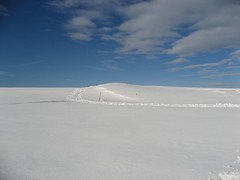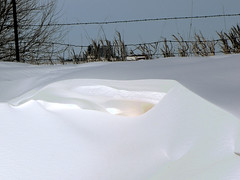
Last year I treated myself to a CD-ROM of this title. It is the "Record and Story of the Disastrous Storm which raged throughout Devon and Cornwall and West Somerset on the night of March 9th, 1891." That's exactly 107 years ago. My Devon ancestors lived through it. One of them, the brother of my g.g. grandfather, still living in Hennock, wrote of it to his children in New Zealand, saying that there was still some snow left unmelted some 6 or 7 weeks on. The Dartmoor writer Eden Philpotts, described it graphically in his novel The American Prisoner (published in 1904).

I think that if you had lived through it, the memory would have stayed with you forever, for “…no such storm had visited the West of England within remembrance.” The Times, March 1891.

Between the 9th and 13th March 1891, Cornwall and Devon were almost entirely cut off from the rest of Britain by a storm of such terrible ferocity that more than 200 people and 6,000 animals perished. Violent gales brought down trees, temperatures plummeted below zero and snow drifted in places up to 15 feet high. This meant that ships foundered on rocks and roads became impassable and trains found themselves snowbound in the middle of nowhere. Unable to face the blizzard, ships ran to safety in Falmouth harbour. However, not all of them made it."

One ship putting into Falmouth harbour, the Bay of Panama, foundered outside the harbour, where the decision had mistakenly been made to heave to in worsening visibility. A combination of terrific winds, crashing waves and poor visibility swept crew (including the Captain and his wife) overboard and the Mate ordered the remaining crew to climb up the rigging. They were found the next day either frozen corpses or barely cling to life. Only 17 of the 40 crew survived.
Meanwhile on land, two feet of snow fell - four feet on the higher ground of Dartmoor. Hurricane-force winds piled it into drifts 15 feet deep and 6,000 sheep perished. A total of 14 trains were stranded on their journeys, and the Princetown train ploughed into a drift on the line near Horsford Farm and the driver and 6 passengers were stranded for 3 days, being rescued on 11th March, but the train could not be moved before the 19th!. During this blizzard, which lasted 36 hours, 220 people died, mostly crew at sea where 65 vessels were lost in the English and Bristol channels.
That makes the winter of 1962/3, which I remember vividly, seem like a picnic!
Now for the strangest of strange coincidences. Earlier in the week, never having heard of one before, I discovered that you can have Moonbows. In researching this blog entry, I turned to Eden Phillipotts, a Dartmoor author who my dad told me REALLY knew the moor and described it so well (my dad grew up at the edge of Dartmoor and used to cycle 100 miles in a day all over the moor in his teens). I opened "Eden Phillpotts On Dartmoor" and it fell open at a page on his novel The Whirlwind, and this passage met my eye:
"Through the wild weather they passed, presently breasted White Hill, and bent to the tremendous stroke of the wind. Fierce, thin rain drove across the semi-darkness, and where a rack of cloud was torn wildly into tatters, the hunter's moon seemed to plough and plunge upon her way through the stormy seas of the sky . . . Then a wonderful spectacle appeared above them in the firmament.
From the depth of the northern heavens there sprang an immense halo of colourless light, where the moon shone upon un-numbered particles of flying rain. Wan, yet luminous, flung with one perfect sweep upon the storm, it endured - the only peaceful thing in that wild world of tumultuous cloud and clamouring wind. The arch of the lunar rainbow threw its solem and radiant span across the whole earth from west to east. It framed all Dartmoor, and one shining foot seemed to sink upon the Severn Sea, while the other marked the places of the dawn."
Thanks dad . . .


1 comment:
What a beautiful descriptive passage that last is. I'll have to ask the captain about that blizzard. It may well be right up there with record maritime events, many of which he is familiar with.
Nancy
Post a Comment